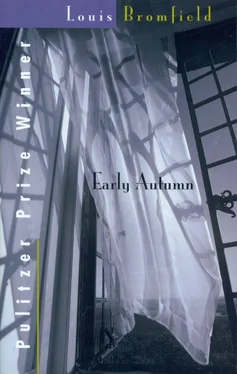It seemed to her that this fidelity was a terrible, a wicked, thing.
And she came to understand that through all their talk together, the thought, the idea, of Michael had been always present. It was almost as if they had been speaking all the while about Michael and herself. A dozen times the old man had touched upon it, vaguely but surely. She had no doubts that Aunt Cassie had long since learned all there was to learn from Miss Peavey of the encounter by the catnip bed, and she was certain that she had taken the information to her brother. Still, there was nothing definite in anything Miss Peavey had seen, very little that was even suspicious. And yet, as she looked back upon her talk with the old man, it seemed to her that in a dozen ways, by words, by intonation, by glances, he had implied that he knew the secret. Even in the end when, cruelly, he had with an uncanny sureness touched the one fear, the one suspicion that marred her love for Michael, by saying in the most casual way, “Still, I think we’d better be careful of him. He’s a clever Irishman on the make … and such gentlemen need watching. They’re usually thinking only of themselves.”
And then the most fantastic of all thoughts occurred to her … that all their talk together, even the painful, tragic confidence made with such an heroic effort, was directed at herself. He had done all this—he had emerged from his shell of reticence, he had humiliated his fierce pride—all to force her to give up Michael, to force her to sacrifice herself on the altar of that fantastic ideal in which he believed.
And she was afraid because he was so strong; because he had asked her to do nothing that he himself had not done.
She would never know for certain. She saw that, after all, the John Pentland she had left a little while before still remained an illusion, veiled in mystery, unfathomable to her, perhaps forever. She had not seen him at all.
Standing there on the bridge in the black shadow of the hawthorns, all sense of time or space, of the world about her, faded out of existence, so that she was aware of herself only as a creature who was suffering. She thought, “Perhaps he is right. Perhaps I have become like them, and that is why this struggle goes on and on. Perhaps if I were an ordinary person … sane and simple … like Higgins … there would be no struggle and no doubts, no terror of simply acting, without hesitation.”
She remembered what the old man had said of a world in which all action had become paralyzed, where one was content simply to watch others act, to live vicariously. The word “sane” had come to her quite naturally and easily as the exact word to describe a state of mind opposed to that which existed perpetually at Pentlands, and the thought terrified her that perhaps this thing which one called “being a Pentland,” this state of enchantment, was, after all, only a disease, a kind of madness that paralyzed all power of action. One came to live in the past, to acknowledge debts of honor and duty to people who had been dead for a century and more.
“Once,” she thought, “I must have had the power of doing what I wanted to do, what I thought right.”
And she thought again of what Sabine had said of New England as “a place where thoughts became higher and fewer,” where every action became a problem of moral conduct, an exercise in transcendentalism. It was passing now, even from New England, though it still clung to the world of Pentlands, along with the souvenirs of celebrated “dear friends.” Even stowing the souvenirs away in the attic had changed nothing. It was passing all about Pentlands; there was nothing of this sort in the New England that belonged to O’Hara and Higgins and the Polish mill workers of Durham. The village itself had become a new and different place.
In the midst of this rebellion, she became aware, with that strange acuteness which seemed to touch all her senses, that she was no longer alone on the bridge in the midst of empty, mist-veiled meadows. She knew suddenly and with a curious certainty that there were others somewhere near her in the darkness, perhaps watching her, and she had for a moment a wave of the quick, chilling fear which sometimes overtook her at Pentlands at the times when she had a sense of figures surrounding her who could neither be seen nor touched. And almost at once she distinguished, emerging from the mist that blanketed the meadows, the figures of two people, a man and a woman, walking very close to each other, their arms entwined. For a moment she thought, “Am I really mad? Am I seeing ghosts in reality?” The fantastic idea occurred to her that the two figures were perhaps Savina Pentland and Toby Cane risen from their lost grave in the sea to wander across the meadows and marshes of Pentland. Moving through the drifting, starlit mist, they seemed vague and indistinct and watery, like creatures come up out of the water. She fancied them, all dripping and wet, emerging from the waves and crossing the white rim of beach on their way toward the big old house. …
The sight, strangely enough, filled her with no sense of horror, but only with fascination.
And then, as they drew nearer, she recognized the man—something at first vaguely familiar in the cocky, strutting walk. She knew the bandy legs and was filled suddenly with a desire to laugh wildly and hysterically. It was only the rabbit-like Higgins engaged in some new conquest. Quietly she stepped farther into the shadow of the hawthorns and the pair passed her, so closely that she might have reached out her hand and touched them. It was only then that she recognized the woman. It was no Polish girl from the village, this time. It was Miss Egan—the starched, the efficient Miss Egan, whom Higgins had seduced. She was leaning on him as they walked—a strange, broken, feminine Miss Egan whom Olivia had never seen before.
At once she thought, “Old Mrs. Pentland has been left alone. Anything might happen. I must hurry back to the house.” And she had a quick burst of anger at the deceit of the nurse, followed by a flash of intuition which seemed to clarify all that had been happening since the hot night early in the summer when she had seen Higgins leaping the wall like a goat to escape the glare of the motorcar lights. The mysterious woman who had disappeared over the wall that night was Miss Egan. She had been leaving the old woman alone night after night since then; it explained the sudden impatience and bad temper of these last two days when Higgins had been shut up with the old man.
She saw it all now—all that had happened in the past two months—in an orderly procession of events. The old woman had escaped, leading the way to Savina Pentland’s letters, because Miss Egan had deserted her post to wander across the meadows at the call of that mysterious, powerful force which seemed to take possession of the countryside at nightfall. It was in the air again tonight, all about her … in the air, in the fields, the sound of the distant sea, the smell of cattle and of ripening seeds … as it had been on the night when Michael followed her out into the garden.
In a way, the whole chain of events was the manifestation of the disturbing force which had in the end revealed the secret of Savina’s letters. It had mocked them, and now the secret weighed on Olivia as a thing which she must tell someone, which she could no longer keep to herself. It burned her, too, with the sense of possessing a terrible and shameful weapon which she might use if pushed beyond endurance.
Slowly, after the two lovers had disappeared, she made her way back again toward the old house, which loomed square and black against the deep blue of the sky, and as she walked, her anger at Miss Egan’s betrayal of trust seemed to melt mysteriously away. She would speak to Miss Egan tomorrow, or the day after; in any case, the affair had been going on all summer and no harm had come of it—no harm save the discovery of Savina Pentland’s letters. She felt a sudden sympathy for this starched, efficient woman whom she had always disliked; she saw that Miss Egan’s life, after all, was a horrible thing—a procession of days spent in the company of a mad old woman. It was, Olivia thought, something like her own existence. …
Читать дальше












